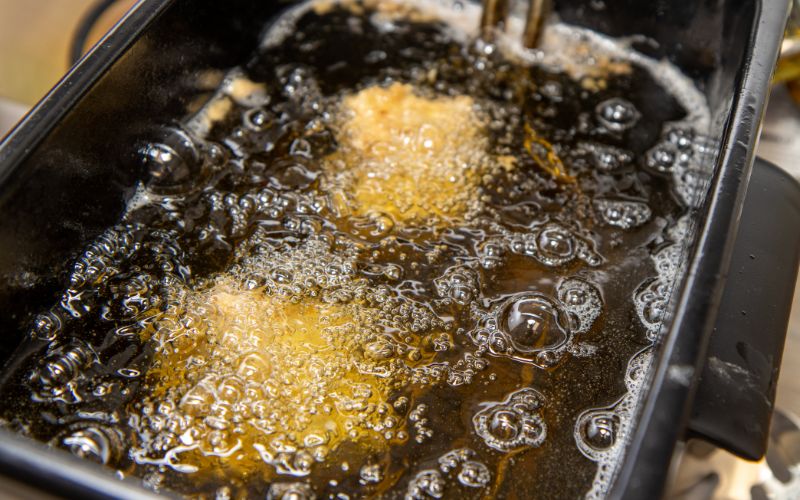Oil is an indispensable ingredient in every family’s kitchen. Many people, due to economic constraints, have a habit of reusing old cooking oil, not knowing that this practice can pose serious health risks. Let’s explore the potential dangers of reused oil and learn how to mitigate them in this article.
1. Health Hazards of Reusing Cooking Oil
Increased Cancer Risk: Reheating cooking oil multiple times can lead to the production of higher levels of aldehyde and polycyclic aromatic hydrocarbons (PAHs). These toxic chemicals, if consumed and accumulated in the body over time, can increase the risk of cancer.
Additionally, using reused oil to cook can elevate inflammatory markers in the body and lead to increased risk of inflammation, impaired immune function, and susceptibility to infections. This is particularly concerning for individuals with heart disease, diabetes, or obesity.
Raised LDL Cholesterol Levels: Consuming foods prepared with repeatedly reheated oil can result in elevated levels of LDL cholesterol, the so-called “bad” cholesterol. This, in turn, increases the risk of cardiovascular diseases, chest pain, and even stroke.
 Health Hazards of Reusing Cooking Oil
Health Hazards of Reusing Cooking Oil
Food Poisoning: Old oil, if not properly filtered, can contain large amounts of food debris, creating an ideal environment for the growth of Clostridium boutlinum bacteria, which produces toxins that can cause food poisoning in humans.
Increased Stomach Acid: Regular consumption of old cooking oil can exacerbate feelings of discomfort and burning sensations in the stomach and throat, among other health issues. Therefore, it is best to avoid using old oil and limit your consumption of street food, especially if you frequently experience acid reflux.
Furthermore, the repeated use of old oil has been linked to liver problems, nerve damage, and, according to BS Le Thao Nguyen from the Nutrition and Dietetics Department of BV District 11 in Ho Chi Minh City, an increased risk of obesity and diseases such as cardiovascular disease and diabetes.
2. Can Cooking Oil be Reused Safely?
Given the health risks outlined above, it is evident that reusing cooking oil is not safe. However, if you find yourself in a situation where you must reuse old oil, keep the following in mind:
-
Dispose of oil after two uses maximum.
-
Avoid heating oil to the point of smoking, and do not use oil that has begun to smoke, as this indicates the release of harmful toxins.
-
Allow the oil to cool and filter out any debris before storing it for reuse.
-
If your stored oil develops a frothy appearance, an unusual odor, or a discolored hue, discard it immediately.
 Can Cooking Oil be Reused Safely?
Can Cooking Oil be Reused Safely?
3. How to Reduce the Use of Reheated Oil
To minimize your consumption of reheated oil, consider the following tips:
-
Opt for home-cooked meals instead of street food or takeout.
-
Practice portion control to reduce excess oil usage during food preparation.
-
Bring your own homemade meals when traveling or on vacation to avoid relying on reheated oil-cooked food.
 Tips to Reduce the Use of Reheated Oil
Tips to Reduce the Use of Reheated Oil
In conclusion, reusing cooking oil poses significant health risks. By understanding these risks and following the advice provided in this article, you can make informed choices to protect your health and that of your loved ones.






























